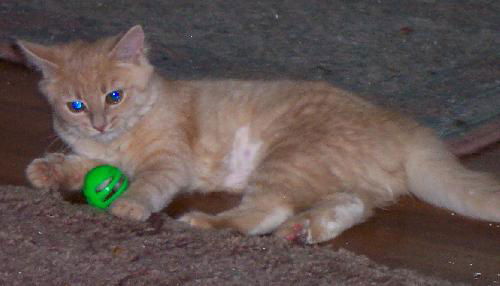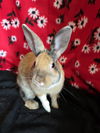|
Northeast Animal Rescue
|
HomeAnimalsAbout UsContact Us | |
|
Apricot's Web Page

Name: Apricot
Status: Adopted!
Adoption Fee: $100.00
Species: Cat
Breed: Domestic Long Hair (long coat)
Sex: Female (spayed)
Current Age: 17 Years 4 Months (best estimate)
Activity Level: Highly Active
Indoor or Outdoor: Indoor Only
Good with Cats: Yes
Declawed: No
Housetrained: Yes
Special Needs: Encyclopedia of Feline Veterinary Medical Information
Cerebellar Hypoplasia
The cerebellum is the portion of the brain responsible for the control of motion. When a puppy or kitten is born with an underdeveloped cerebellum, the condition is known as congenital cerebellar hypoplasia. There are infectious causes of this condition in both cats (panleukopenia infection prior to birth) and dogs (herpes virus infection prior to birth). Improper development of the cerebellum may occur due to injury, poisoning or just from an accident in development in the uterus. It is generally possible to see signs of this condition almost as soon as the puppy or kitten is born. Affected animals have tremors and unusual jerky movements or may fall down when they try to move. The symptoms do not get worse as they age. As the kitten or puppy grows it will learn to compensate for its condition but there are usually lifelong signs of a decreased ability to coordinate movement. Almost all dogs and cats with congenital cerebellar hypoplasia can live happily as pets with a little special care to compensate for their disabilities. This condition can be confused with cerebellar abiotrophy, a different disorder in dogs in which the puppy has a normal cerebellum at birth but it gradually dies. Signs of disease identical to cerebellar hypoplasia occur but the timing is different. Puppies with this condition seem normal at birth but usually start to show signs of problems after they are 2 months or more of age.
Description:
Apricot is 5 months old. At 10 weeks old, she was turned in with her 3 sisters to a shelter, facing euthanasia because of “possible neurological problems.” She is a mild CH kitty. When sitting still or walking, her head bobs and her hind legs wobble slightly. However, she can run and jump and use the litter box just the same as her non-CH housemates. She is talkative, making a half meow, half purr kind of sound when she wants your affection. Her favorite toy is a green plastic ball with a bell inside. She will carry it in her mouth and chase her tail at the same time! Apricot is just as content to curl up with me on the couch or sit on my lap when I am at the computer. Her other favorite pastime is wrestling with her sister Olivia. She play-bites, sometimes too hard. I’m trying to break her of this. I would suggest no small children (or people taking blood-thinners) in the home she goes to. She is spayed, vaccinated and batch tested negative for felv/fiv. Please fill an application out at www.nar.rescuegroups.org
|









